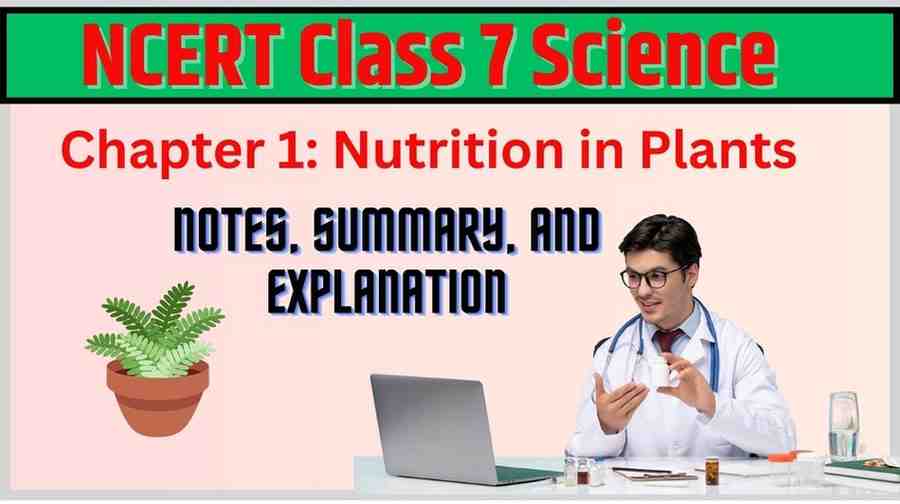Nutrition in Plants: Nutrition is one of the most essential life processes. All living organisms, whether plants, animals, or humans, require food to survive. Food provides energy for growth, repair, and maintaining life processes. In this chapter, Nutrition in Plants, we will understand how plants prepare their own food, different modes of nutrition, and why this process is vital for the environment. we shall read everything in detail, hence read till the final.
What is Nutrition?
Nutrition is the process by which living organisms obtain and utilize food materials for energy, growth, and repair. It includes the intake of food, digestion, absorption, and utilization.
Types of Nutrition
- Autotrophic Nutrition – Organisms (like green plants) prepare their own food using simple raw materials (CO₂ and H₂O) with the help of sunlight.
- Heterotrophic Nutrition – Organisms (like humans and animals) depend on plants or other organisms for food.
Photosynthesis – The Process of Making Food in Plants
Plants are autotrophs, which means they prepare their own food. This process is called Photosynthesis.
Definition of Photosynthesis
Photosynthesis is the process by which green plants prepare their own food using carbon dioxide (CO₂), water (H₂O), sunlight, and chlorophyll, releasing oxygen as a by-product.
Equation of Photosynthesis: ![]()
Raw Materials Needed for Photosynthesis
- Carbon Dioxide (CO₂): Taken from the air through tiny pores in leaves called stomata.
- Water (H₂O): Absorbed from the soil by roots.
- Sunlight: Provides energy for the chemical reaction.
- Chlorophyll: Green pigment in leaves that captures sunlight.
NCERT Class 7 Science Syllabus 2025-26 – Detailed Chapter-wise Guide with PDF Download
Importance of Photosynthesis
- Provides food for all living organisms.
- Produces oxygen for respiration.
- Maintains the balance of CO₂ and O₂ in the atmosphere.
- Forms the base of the food chain.
Other Modes of Nutrition in Plants
Not all plants prepare their own food. Some follow different modes of nutrition:
1. Parasitic Nutrition
- Plants that live on other plants and absorb food from them.
- Example: Cuscuta (Amarbel).
2. Saprotrophic Nutrition
- Plants that feed on dead and decaying matter.
- Example: Fungi (Mushrooms, Bread mould).
3. Symbiotic Nutrition
- Two organisms live together and share food/resources.
- Example: Lichens (algae + fungi).
4. Insectivorous Plants
- Plants that trap insects and use them as a source of nitrogen.
- Example: Pitcher Plant, Venus Flytrap.
Table: Difference Between Autotrophic & Heterotrophic Nutrition
| Feature | Autotrophic Nutrition | Heterotrophic Nutrition |
|---|---|---|
| Mode of food preparation | Organisms prepare their own food | Organisms depend on others for food |
| Example | Green plants | Humans, animals |
| Raw materials required | CO₂, H₂O, sunlight, chlorophyll | Ready-made food |
| By-product | Oxygen | Carbon dioxide |
Activity / Experiment (Classroom Friendly)
Activity: Place a potted plant in a dark room for 2–3 days. Then cover part of a leaf with black paper and keep it in sunlight for a few hours. Test the leaf with iodine solution.
Observation: The uncovered part turns blue-black, showing starch formation (photosynthesis).
Conclusion: Sunlight is necessary for photosynthesis.
Key NCERT Questions (with answers)
Q1. Why are leaves called the food factories of plants?
Answer: Leaves contain chlorophyll, which captures sunlight to prepare food by photosynthesis. Hence, they are called food factories.
Q2. Name the pores on leaves that help in gaseous exchange.
Answer: Stomata.
Q3. Give examples of plants that do not have chlorophyll.
Answer: Cuscuta (Amarbel), fungi (mushrooms).
Summary of Chapter
- Nutrition is essential for all organisms.
- Plants are autotrophs; they prepare food through photosynthesis.
- Photosynthesis requires CO₂, water, sunlight, and chlorophyll.
- Not all plants are autotrophs; some are parasitic, saprotrophic, symbiotic, or insectivorous.
- Photosynthesis is the foundation of life on Earth.
Keywords for Revision
- Nutrition
- Autotrophs
- Photosynthesis
- Chlorophyll
- Stomata
- Parasite
- Saprotroph
- Symbiosis
- Insectivorous plants

